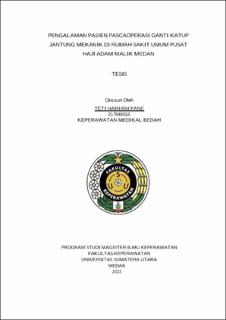| dc.contributor.advisor | Tanjung, Dudut | |
| dc.contributor.advisor | Hasan, Refli | |
| dc.contributor.author | Pane, Teti Hariani | |
| dc.date.accessioned | 2024-09-03T04:56:18Z | |
| dc.date.available | 2024-09-03T04:56:18Z | |
| dc.date.issued | 2023 | |
| dc.identifier.uri | https://repositori.usu.ac.id/handle/123456789/96583 | |
| dc.description.abstract | Heart valve replacement surgery is the definitive management of heart valve abnormalities. When a patient meets the criteria for heart valve replacement surgery, there are two choices of valve types that will be used, namely mechanical valves and bioprosthetic valves. The biggest advantage of mechanical heart valves is long-term durability up to lifetime, while the disadvantage is the need for anti-coagulants which are also lifelong. Patients post mechanical heart valve replacement must maintain a certain level of blood viscosity balance. Being too thick (thrombosis) or too thin (bleeding) can both pose life-threatening problems. The purpose of this study was to explore the experiences of patients after mechanical heart valve replacement surgery in order to find a better care plan. This type of research is qualitative research with a descriptive phenomenological approach. There were 13 participants in this study who were patients who had undergone mechanical heart valve replacement surgery. The data collection method used in-depth interviews and the research data were analyzed using the Colaizzi method. There were 7 themes identified, namely 1) physical changes after mechanical heart valve replacement surgery, 2) changes in sleep after mechanical heart valve replacement surgery 3) changes in activities after mechanical heart valve replacement surgery 4) psychological problems of participants after mechanical heart valve replacement surgery, 5) obstacles faced by patients after mechanical heart valve replacement surgery, 6) compliance with following home care, and 7) social support needed. The experiences and things felt by patients after undergoing heart valve replacement surgery are important markers for quality improvement because these experiences affect patients reactions and contributions to the nursing care they receive. | en_US |
| dc.language.iso | id | en_US |
| dc.publisher | Universitas Sumatera Utara | en_US |
| dc.subject | Patient Experince | en_US |
| dc.subject | Heart Valve Disease | en_US |
| dc.subject | Mechanical Heart Valve Replacement Surgery | en_US |
| dc.subject | SDGs | en_US |
| dc.title | Pengalaman Pasien Pascaoperasi Ganti Katup Jantung Mekanik di Rumah Sakit Umum Pusat Haji Adam Malik Medan | en_US |
| dc.title.alternative | Postoperative Patient Experience of mechanical Heart Valve Replacement at Haji Adam Malik Hospital Medan | en_US |
| dc.type | Thesis | en_US |
| dc.identifier.nim | NIM217046010 | |
| dc.identifier.nidn | NIDN0015107304 | |
| dc.identifier.nidn | NIDN0003046101 | |
| dc.identifier.kodeprodi | KODEPRODI14101#Ilmu Keperawatan | |
| dc.description.pages | 113 Pages | en_US |
| dc.description.type | Tesis Magister | en_US |


